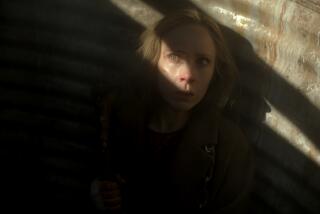‘Fargo’ recap: Massacre at Sioux Falls
- Share via
In the end, it all comes back to Franz Kafka.
“The Castle,” the ninth episode of “Fargo’s” second season, is the second episode of the season to make reference to the work of Kafka, which is unsurprising given the themes running throughout the episode and the season.
The episode’s running time is a taut 48 minutes, give or take a credits sequence -- a departure from some of the more languorous episodes the season has produced, but appropriate for the tense and inevitable slaughter that ensues.
On the heels of last week’s murder of Dodd and ambush by lawmen, it’s determined by local South Dakota officers, who sheepishly admit that their precinct is in the pocket of Kansas City, that Ed and Peggy will be safer in the wild, wired and used as bait for Mike Milligan.
Lou disagrees with local police department, because he is a sane and rational man, but sanity and rationale don’t get him far in the wilds of South Dakota. He is summarily dismissed from duty and sent back to Minnesota, leaving the Blumquists to their fate in the hands of a reticent Hank and the South Dakota branch of the Keystone Cops.
And Hanzee. Never far from where the action is, Hanzee sets his own plan in action, calling down the Gerhardts to save Dodd (who is dead) from the Kansas City mooks (who are actually half a dozen officers of the law) and setting into motion the legendary Massacre at Sioux Falls.
Like so much of the season before it, the episode unfolds like a bedtime story, even going so far as to have an uncredited narrator who sounds suspiciously like Martin Freeman (It is Martin Freeman.) reading from a tome entitled “History of True Crime in the Mid West.”
The narrator seems singularly focused on Hanzee’s choice to sell out his adopted people and on trying to determine when, precisely, the decision was made. But to look at the world in such absolutes is to miss the greater theme of “Fargo,” which is that no one has control over anything.
Kafka’s novel “The Castle” tells the tale of a man who arrives in a village and struggles to live, thanks to a mysterious bureaucracy housed in a castle. It’s a tale of alienation, of struggling against a power you cannot see clearly and will not be reasoned with.
In “Fargo’s” “The Castle,” Lou Solverson is trapped by the unceasingly imbecilic bureaucracy of the greater South Dakota state police force. Hanzee continues his lifetime of alienation from both his adopted clan and himself. The world continues spinning in a completely arbitrary fashion.
Though Hanzee clearly best inhabits Kafka’s themes of alienation, his choice to lure the Gerhardts to their deaths wasn’t necessarily something that suggests a lifetime of planning, rather it implies something more akin to a lifetime of pain.
Hanzee, like every other character on “Fargo,” is trapped in a snow globe, where forward momentum is an illusion and freedom only comes when you understand that there’s no freedom to be had. No matter what drives them, each character in the series is determined to make the best decision he or she can and, regardless of what that decision is, they remain locked in the paths determined for them since birth.
Kafka never finished writing “The Castle” but confided two possible endings to a fried. In the first, the novel’s protagonist finds himself on his deathbed receiving notice from the castle that, though he has no claim to it, he will be allowed to stay in the town. It’s a final note of bureaucratic ridiculousness before death, but delivered as though a strange bit of final grace from on high.
The other ending? That Kafka would never finish writing the book. Indeed, “The Castle” ends mid-sentence.
For a show set in a traditionally faith-based environment, “Fargo” has few dealings with the trappings of Christianity, though the argument could be made that religion is the biggest bureaucracy going in the upper Midwest. References to faith or what comes after seem made specifically by Bear Gerhardt when trying to comfort his mother about the losses in the family. He tells her that the family will be together “on high,” evidence of his own skewed moral compass.
Bear assumes his family is going to heaven because that’s what the bureaucracy has taught him. There is no true rhyme or reason to morality or life on “Fargo.” There is merely the ceaseless march toward the end of their lives, on paths laid out for them years, maybe millenniums, before.
Were life fair, if choices mattered, Lou would not be on the verge of missing a final goodbye with his wife. If choices mattered, Molly Solverson would not be on the verge of losing both her mother and grandfather within hours of each other. If life played by discernible rules, then Lou’s logic would win out, the massacre would be avoided, war would be resolved another way.
Yet in this muddled world, there is still room for grace.
As ridiculous as it may sound, “Fargo” has found one inlet for belief in its universe. Via UFOs.
In the midst of a battle that would have surely left Lou a bloody smear on the ground at the hands of Bear, the motel parking lot where the Massacre of Sioux Falls was playing out was lighted by the three bright lights of a flying saucer. The moment was surreal, transcendent, and it allowed Lou an unlikely opportunity to save himself. (It additionally afforded Peggy the opportunity to deliver the greatest line in “Fargo” history: “It’s just a flying saucer, Ed. We gotta go.”)
Grace came via a UFO. Hank’s study was full of the trappings of UFO research -- clearly he had found in it an opportunity to believe in something bigger than himself. The UFOs haunt this season of “Fargo” like a spirit, willing to be whatever the person who sees them needs. They are, almost certainly, a bureaucracy like all the rest. But for now, it’s a bureaucracy people can believe in.
By episode’s end, Peggy and Ed are on the run again, with Hanzee in hot pursuit. Hank is bleeding out in a motel room. Betsy has collapsed while trying to prepare frozen orange juice concentrate. The last of the Gerhardts are dead, Bear of a gunshot wound from Lou and Floyd of a Hanzee-delivered stab wound, a final betrayal.
This is where we leave “Fargo” as we head into the Season 2 finale. In the words of the ever eloquent Mike Milligan: “OK then.”
Follow me on Twitter at @midwestspitfire
More to Read
The complete guide to home viewing
Get Screen Gab for everything about the TV shows and streaming movies everyone’s talking about.
You may occasionally receive promotional content from the Los Angeles Times.







